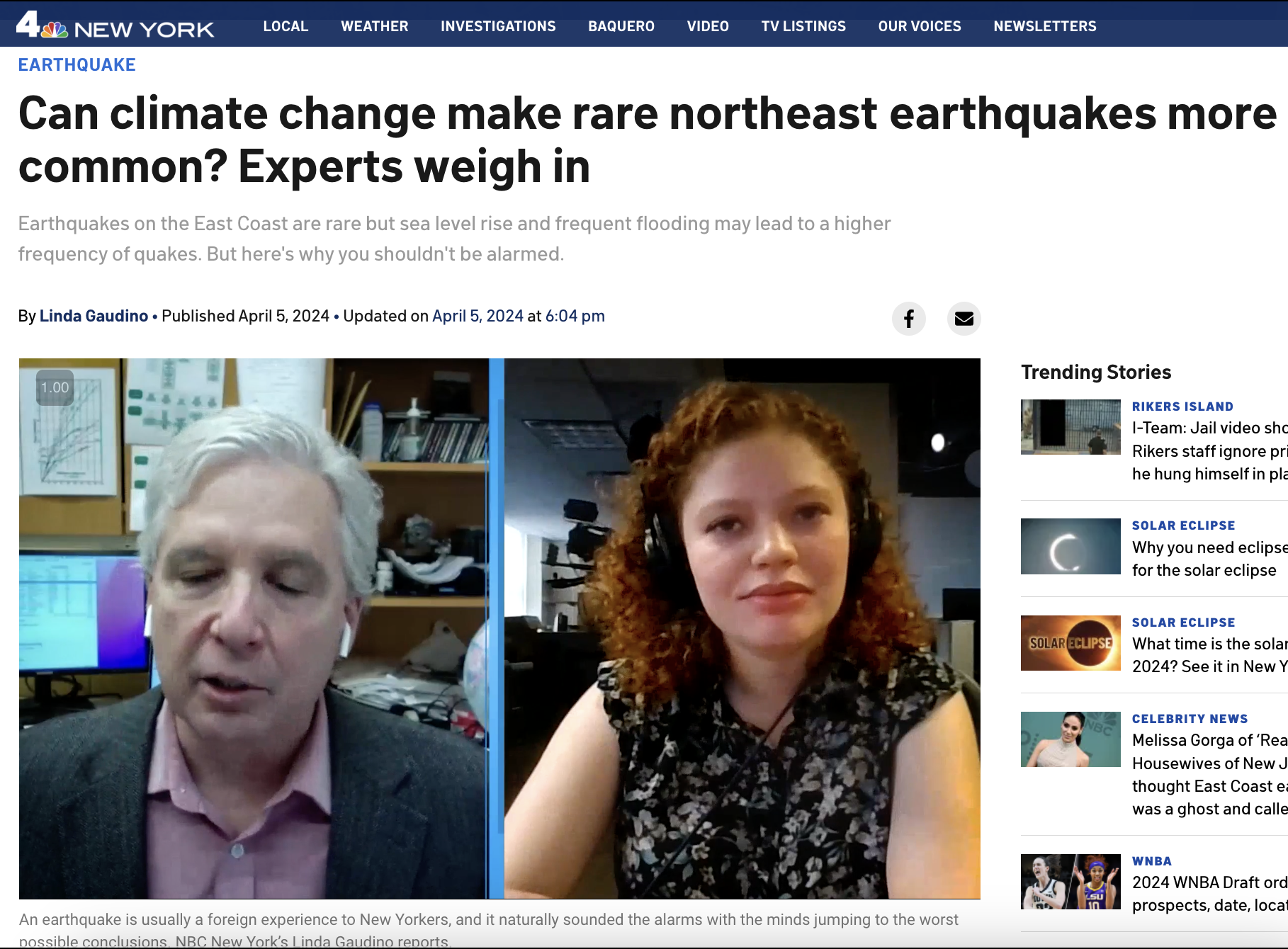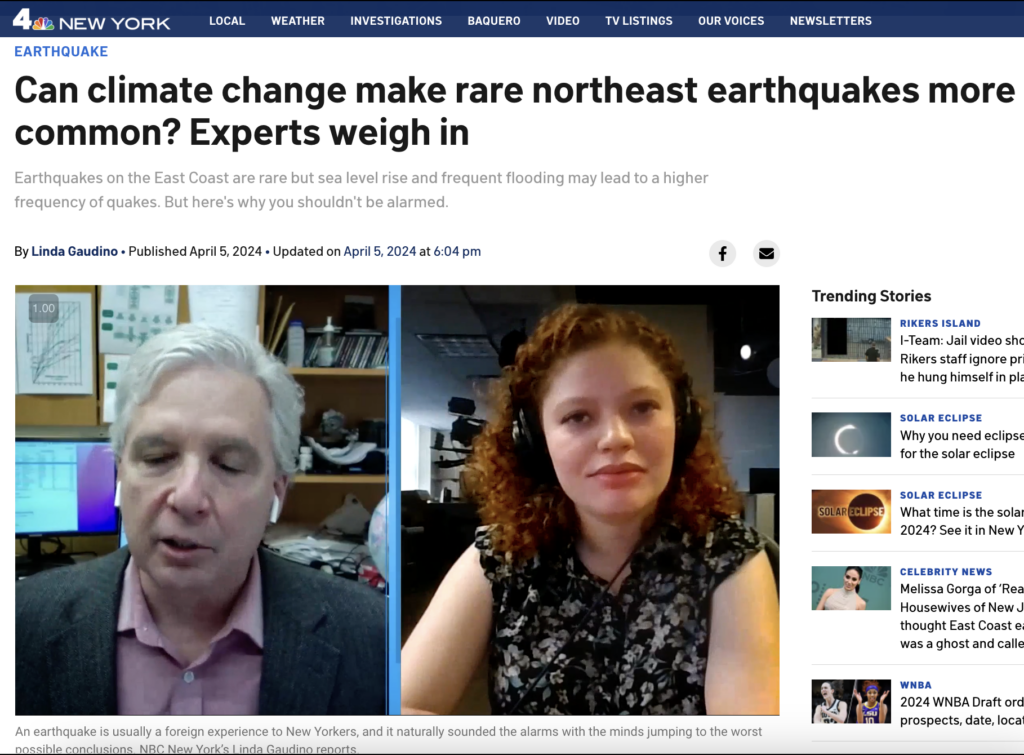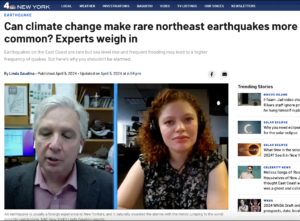Of Course the New York Earthquake Was Due to Climate Change. What Else Could It Be?
“Lord, what fools these mortals be,” exclaimed the fairy Puck in Shakespeare’s “A Midsummer Night’s Dream.” Obviously, Puck was talking about climate hysterics who blame everything unusual that happens these days on climate change.
It was inevitable, then, that the earthquake on Friday on the East Coast centered in the New York/New Jersey area would lead to learn-ed men and women of science (and not so learn-ed men and women) drawing the logical conclusion that because it’s bad and it happened on this planet, it had to be due to climate change.
For the record, earthquakes are the result of stresses building up along fault lines in the earth that suddenly “slip” shooting one fault over another causing the earth to move. These are massive forces at work, dwarfing any attempts by humans to control or affect them.
But if you look really, really closely and wish really, really, hard, you can see climate change at work in the earthquake.
Dr. Antonios Marsellos, an associate professor in the Department of Geology, Environment, and Sustainability at Hofstra University, tries to explain.
“An earthquake is based on tectonic plates, and New York is sitting on a ‘lazy’ plate, which is good, meaning we do not have so many earthquakes, but there are other things that happen — too much rain or drought,” Dr. Marsellos told NBC New York.
The rain can lead to floods that if they go on long enough, could result in landslides. The slides can “lubricate” faults and may be a reason for the increased frequency of quakes, explained Dr. Marsellos.
Jeffrey Park, professor of Earth and Planetary Sciences at Yale University, also thinks that climate change had a hand in the earth moving billions of tons of rocks.
Dr. Park indicated the continuous rise in sea levels can increase the amount of pressure exerted on the Earth’s shelves and coastlines, resulting in mostly scattered and infrequent quakes with long lead times.
The positive takeaway is that experts say there is no need to be alarmed and no elevated quake is expected any time soon.
Anything that can “lubricate” the earth well enough to cause an earthquake needs to be bottled and sold. “White Lightning,” indeed.
You might recall Rep. Hank Johnson sitting in a committee hearing in 2010 worrying that Guam would “capsize” because there were going to be too many Marines on the island.
He queried Adm. Robert Willard, head of the U.S. Pacific fleet at the time.
“My fear is that the whole island will become so overly populated that it will tip over and capsize,” Johnson said. Willard paused and replied, “We don’t anticipate that.”
The admiral gave the proper response; respectful and unintentionally hilarious. But what do you do with this “science-based” candidate for the Senate from New Jersey?
I experienced my first earthquake in NJ. We never get earthquakes. The climate crisis is real.
The weirdest experience ever.
— Christina Amira Khalil (@Christina4NJ) April 5, 2024
Ms. Khalil linked to an article in an insurance journal that discusses links between climate change and earthquakes.
- Geologists have pointed in recent years to an apparent correlation between water weight on the Earth’s surface and the potential for earthquakes.
- Past seismic activity has prompted some researchers to investigate the potential effects of increased global precipitation and drought on earthquake frequency.
Geologists have found an “apparent correlation”? Researchers are investigating the “potential effects” of more rainfall and drought on earthquake frequency?
Rainfall or drought? Which is it?
NBC New York: Can climate change make rare northeast earthquakes more common? Experts weigh in
#
Dr. Antonios Marsellos, an associate professor in the Department of Geology, Environment, and Sustainability at Hofstra University, tries to explain. “An earthquake is based on tectonic plates, and New York is sitting on a ‘lazy’ plate, which is good, meaning we do not have so many earthquakes, but there are other things that happen — too much rain or drought,” Dr. Marsellos told NBC New York. The rain can lead to floods that if they go on long enough, could result in landslides. The slides can “lubricate” faults and may be a reason for the increased frequency of quakes, explained Dr. Marsellos.
Jeffrey Park, professor of Earth and Planetary Sciences at Yale University, also thinks that climate change had a hand in the earth moving billions of tons of rocks. “Dr. Park indicated the continuous rise in sea levels can increase the amount of pressure exerted on the Earth’s shelves and coastlines, resulting in mostly scattered and infrequent quakes with long lead times. The positive takeaway is that experts say there is no need to be alarmed and no elevated quake is expected any time soon.”
#
Related:
2022 Study: Long-Term Forecasting of Strong Earthquakes in North America, South America, Japan, Southern China and Northern India With Machine Learning – “Earthquakes of great intensity that are caused by natural processes cannot be avoided but only forewarned with their often catastrophic and damaging impacts minimized.”
Warmists have long history of blaming earthquakes on AGW!
Flashback: More Mega Earthquakes in a Climate Changed World Say Scientists’
Flashback: Actor Danny Glover links Haitian earthquake to global warming?
2015: Newsweek: More earthquakes coming due to ‘climate change’ – AGW ‘can affect the underlying structure of the Earth’ – UCL’s Professor Bill McGuire’s recent book Waking the Giant: How a Changing Climate Triggers Earthquakes, Tsunamis and Volcanoes, he ponders the effects of the 100m rise of sea-levels that’s threatened should all the remaining ice on the planet melt.’
It’s the ebb and flow of rainwater in the great river deltas of India and Bangladesh, and the pressure that puts on the grinding plates that make up the surface of the planet. Recently discovered, that causal factor is seen by a growing body of scientists as further proof that climate change can affect the underlying structure of the Earth.
Because of this understanding, a series of life-threatening “extreme geological events” – earthquakes, volcanoes and tsunamis – is predicted by a group of eminent geologists and geophysicists including University College London’s Bill McGuire, professor emeritus of Geophysical and Climate Hazards. “Climate change may play a critical role in triggering certain faults in certain places where they could kill a hell of a lot of people,” says Professor McGuire. Some of his colleagues suspect the process may already have started.
#
UN IPCC AR5 co-ordinating lead author Prof. Oliver C Ruppel blames global warming for earthquakes, volcanic eruptions, and tsunamis [email protected] – Ruppel: ‘There is wide scientific consensus that the increased number and intensity of climate change induced natural disasters, such as earthquakes, volcano eruptions, tsunamis and hurricanes, is of alarming concern’
‘A partial explanation may lie in the fact that in the last 20 years, we have definitely had an increase in number of earthquakes we have been able to locate each year. This is because of the tremendous increase in the number of seismograph stations in the world and the many improvements in global communications’
UK Guardian jumps the shark – claims climate change CAN cause earthquakes, volcanos and tsunamis – Warmists now claim everything caused by AGW: ‘Could it be then, that if we continue to allow greenhouse gas emissions to rise unchecked and fuel serious warming, our planet’s crust will begin to toss and turn once again?’





